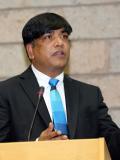Event Updates

"We cannot enjoy prosperity for the few at the expense of the many. We cannot build walls that would keep out a changing climate or dirty air or water that becomes our common heritage," says Steven Stone, Head of the Markets and Resources Branch, Economy Division at UN Environment, in the wake of the 2019 PAGE Ministerial Conference in South Africa.
Research

"Our attachment to existing knowledge and belief systems can often stand in the way of getting a better appreciation of how the world works; only when major crises occur, or when a generation of decision-makers is replaced by a new one, do people recognise the need to use new lenses for “reading” the world around them," says Martine Durand, Chief Statistician and Director of OECD Statistics and Data Directorate.
Research

When half of a country’s wealth is natural capital it is vital this resource is managed well. If people, businesses and government policies put natural capital at risk, then long term sustainable development is jeopardised. A recent meeting in Kampala, Uganda, discussed how natural capital accounts can inform better decision making for a viable future.
Research

"GDP as an indicator has limited capability in differentiating between positive and negative growth externalities and might not reveal the ideal sustainable growth path. By omitting natural and social capital, GDP lacks an inclusive, holistic, and futuristic vision," says Namita Vikas, Group President & Global Head of Climate Strategy & Responsible Banking for YES BANK LTD.
Research

"I think of GDP as a proxy for the well-being that most people desire. At times it is a very poor proxy. It could be improved by expanding the definition of ‘productivity’ and the definition of ‘capital’ in the ‘marginal productivity of capital’ notion that drives growth in most economic models," says Anton Cartwright, green economy researcher at the African Centre for Cities and senior associate of the Cambridge Institute for Sustainability Leadership.
Research

"Comprehensive wealth accounts, which include produced, human, and natural capital, enable countries to apply a productivity measure that shows whether they are increasing in wealth or if their income is based on depleting their natural capital," says Dr. Sofia Ahlroth, Senior Environmental Economist at the World Bank.
Research

"GDP was never meant to measure progress and sustainability. In fact, Simon Kuznets, who pioneered our modern use of GDP, cautioned that it should not be used to measure well-being as its purpose is mainly to track income," says Pushpam Kumar, Senior Economic Advisor for UN Environment.
Research

"We need to mainstream the protection of biodiversity in economic policymaking using the natural capital approach," says John Maughan, Research Programme Manager at the Green Growth Knowledge Platform. "Other means for protecting biodiversity have not been enough."

The transition to a low-carbon economy will require changes at every level of society, from investment in clean innovation and the widespread deployment of resulting green technologies, to behaviour changes and new environmental policies.
Tools and Initiatives

The Deutsche Gesellschaft für Internationale Zusammenarbeit GmbH / German Corporation for International Cooperation (GIZ) invited representatives from 11 emerging economies on a four-day study tour to discuss and learn strategies and good-practices for fostering resource efficiency in the public and private sector.
